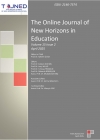TOJNED - Volume 1 - Issue 2 - April 2011
 DEVELOPMENT OF BASIC COMPETENCES IN SCIENCE AND TECHNOLOGY IN MINORITIES WITH LANGUAGE-INDEPENDENT COMPUTER SIMULATIONS
DEVELOPMENT OF BASIC COMPETENCES IN SCIENCE AND TECHNOLOGY IN MINORITIES WITH LANGUAGE-INDEPENDENT COMPUTER SIMULATIONS Miro Puhek, Andrej ├ģ┬Āorgo
Abstract: With the growth of multimedia computers became more important than ever. Internet became linking media that connects people. But circumstances are far from being perfect. On one hand, we have circumstances similar to those in Eden, where students can use various didactical tools, and on the other, students are still left with the white chalk and black board. The main purpose of this article is to present the problem of accessibility of multimedia to users that have limited knowledge of foreign language (in most cases English). On the Faculty of Natural Sciences and Mathematics we developed interactive computer simulations of biological laboratory exercises. Simulations are equipped with translational support that enables users a translation into a chosen foreign language. The simulations Osmosis and Greenhouse effect are presented in this article and can be used by minorities in Slovenia as well as by anybody else who is not fluent in Slovenian language.
 EFFECTS OF AGRICULTURAL TRAINING ON THE ENVIRONMENTAL CONSCIOUSNESS LEVELS OF TURKISH CYPRIOT FARMERS
EFFECTS OF AGRICULTURAL TRAINING ON THE ENVIRONMENTAL CONSCIOUSNESS LEVELS OF TURKISH CYPRIOT FARMERS ├ä┬░brahim KAHRAMANO├ä┼ŠLU, ├ģ┼Šerife G├ā┼ōND├ā┼ōZ
Abstract: This study was conducted to determine the effects of agricultural trainings on the environmental consciousness levels of Turkish Cypriot (TC) farmers. For this reason, a survey was carried by interviewing stakeholders between February and June 2009. In total 200 stakeholders were interviewed where half of them got trained by the Agriculture Extension Service. The ├óŌé¼ŌĆóNew Environmental Paradigm├óŌé¼ŌĆō, was revised according to the nature of the work and thus used in interviews to measure the environmental consciousness levels of TC farmers. Results indicated that 90% of the interviewed farmers were male, indicating the dominance of male farmers in TC agriculture sector. More than half of the farmers (69%) had at least a high school degree. An important result of this study is that, only 28% of the farmers are living with the income of farming and 44% works in another job. There was a significant difference between the trained and nottrained farmers environmental consciousness levels. The average environmental consciousness percentages of the trained and not-trained TC farmers were determined 67.5% and 58.2%, respectively. The other important result of this study is that; the first preference of not-trained TC farmers in weed management is chemical methods where the first preference of trained farmers is mechanical methods. This clearly indicates the difference between the environmental consciousness levels of trained and not-trained TC farmers.
 MULTILINGUAL LEARNING ENVIRONMENT IN FRENCH AND GERMAN LANGUAGE TEACHING DEPARTMENTS
MULTILINGUAL LEARNING ENVIRONMENT IN FRENCH AND GERMAN LANGUAGE TEACHING DEPARTMENTS Mehmet BA├ģ┼ŠT├ā┼ōRK, Recep GULMEZ
Abstract: The objective of the present paper is to shed light on multilingual learning environment in French and German language teaching departments in Turkish universities. The students in these departments are mostly the ones that take university entrance exam, national baccalaureate, and a test in English. They start to learn French and/or German using Turkish. In our study, we suggest that they can acquire these languages by means of using their first foreign language, English, which has typological (syntactical and lexical) similarities instead of using Turkish, which is not of the same family of languages. It is found that using English to teach French/German, therefore, instead of Turkish as a medium of communication in the class, creates a multilingual learning environment, which facilitates vocabulary learning, maintains input permanence, help think and act in that language due to typological features. As shortcomings, it is indicated that falsefriends and teachers lack of English are obstacles to create a multilingual learning environment.
 POSITIONAL ├óŌé¼┼ōINFERIORITY├óŌé¼┬Ø: A POSTCOLONIAL ANALYSIS OF THE EXPERIENCE OF JAMAICAN TEACHERS COLLEGE FACULTY
POSITIONAL ├óŌé¼┼ōINFERIORITY├óŌé¼┬Ø: A POSTCOLONIAL ANALYSIS OF THE EXPERIENCE OF JAMAICAN TEACHERS COLLEGE FACULTY Erold K. Bailey
Abstract: This paper examines the attitude towards teacher education in Jamaica particularly in relation to institutions which have their roots in the normal school system established during the immediate post-slavery/classical colonial era. This analysis is based on data from a larger phenomenological study on the experience of 17 teacher educators from 5 of the 6 teachers colleges in Jamaica. Using a postcolonial studies theoretical frame, the educators experiences were examined for deeper meanings and connections to the country s history of slavery and colonialism. Based on this examination the researcher concludes that there are profound entrenched colonial impositions and retentions that continue to undermine the status of Jamaican teachers colleges as legitimate tertiary institutions.
 TEACH ONLY WHEN UNDERSTANDING: THE STRATEGIES OF TEACHING INDUSTRIAL DESIGN TO THE NET GENERATION
TEACH ONLY WHEN UNDERSTANDING: THE STRATEGIES OF TEACHING INDUSTRIAL DESIGN TO THE NET GENERATION Shu-Wen Tzeng
Abstract: Industrial Design education has been defined by craft and well known for its ├óŌé¼ŌĆöimmersed and ├óŌé¼ŌĆöpractice-based learning environment. Most of Industrial Design schools continue to reference and embrace Bauhaus style studio courses centered on individual, hands-on product development. The design assignments have traditionally focused on researching, sketching, model making, and presentation. However, many industrial design teachers are now struggling with teaching current college design students, the so-called Net Generation, due to their preference and reliance on digital technology for learning. Since design education can never be accomplished solely by using digital technology, design educators are now facing major transformational change as digital technology alters how learning is enabled. This paper will explore and demonstrate how Industrial Design can be taught to the Net Generation with the understanding of their learning mode and characteristics making learning more relevant and effective. Specific examples of approaches integrated into a third year Industrial Design studio course will be illustrated.


